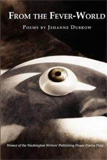December 30, 2011FROM THE FEVER-WORLD
Review by Kristin Berkey-Abbott
Washington Writers’ Publishing House
P.O. Box 15271
Washington, D.C. 20003)
ISBN 0-931846-91-9
2009, 68 pp., $15.00
www.washingtonwriters.org
We are living in a golden age of persona poems. Poets have always experimented with this form, which allows them to explore other characters, but rarely have we seen so many poets doing it so well. We have poets speaking in the voices of characters from fairy tales, from history, from myth, from religious traditions–and then there’s the more challenging feat of creating a persona from scratch, completely from the poet’s imagination.
Even during this golden age of persona poems, we rarely see a poet create a whole volume in the voice of one character–it takes a lot of talent to create a character so interesting that the character can sustain a whole book. Jehanne Dubrow pulls off this feat magnificently in her book From the Fever-World.
This book follows a narrative arc that depicts the life of Ida, a female poet living in Eastern Europe in the early decades of the twentieth century. The book contains a translator’s note at the end, which reads: “After so many years spent in her company, I feel certain that Ida Lewin (or someone like her) existed in the imaginary Polish town of AlwaysWinter.” After reading From the Fever-World several times, I, too, feel like I have been in the company of a real presence, even if an imaginary one.
Dubrow covers much thematic ground with these poems. From the Fever-World shows a span of a woman’s life, from childhood to courtship to the early years of a marriage through motherhood and all the losses in between. Dubrow’s poems, all utilizing the first person voice, help us understand the happiness and the agony that come into one woman’s life, in part because she is a woman.
[In a Woman’s Life]* serves as an overture to the whole volume, although it comes near the end of the book. The poem shows a woman as a creative force in several areas: as a poet, as a baker of cakes, as a wife. Her work in her house takes on a sacramental quality. In these lines, Dubrow makes clear that women’s work is as valuable as any done by men:
She is the psalmist David
in her chores (sing hallelujah
to the cotton sheets that flap
the wind like pages of an open book)
I love this view of housework as hymn, as song of praise, as hallelujah. I love the word play in cotton sheets (the sheets we sleep on, the sheets we write on).
Throughout the book, we see the imaginary poet using metaphors from writing and academic study to explore her life as a woman. Early in her marriage, she begs, “let him be / a scholar and I the text” ([To Be Studied, the Way]). There’s a physicality in these poems, whether Dubrow explores what it means to be a young wife or what it means to lose a child or what it’s like to be extremely sick. The body betrays us in so many ways at the same time we find joy–and these poems don’t shy away from those truths.
Through the life of this imaginary woman in an imaginary town in Poland, Dubrow also explores Judaism. Many of the poems revolve around Jewish holidays and rituals and the ways they were celebrated and observed in Eastern Europe during the first decades of the twentieth century. Many of the images and symbols come from Jewish life, at least Jewish life as it was lived a century ago. Yet even though some of these practices are alien to me, the emotions explored in the poems are universal.
I’m impressed with Dubrow’s ability to depict a world both imaginary and long gone, and yet to infuse these poems with such universal concerns that the poems should appeal to a wide range of readers. So, even if you’re not a woman, even if you’re not Jewish, even if you’re living in a different part of the world, make some time to spend with these poems. You’ll see your own world with different eyes after you do.
*The poems in From the Fever-World have no titles. I’m following the model that Dubrow gives in the Acknowledgements section.